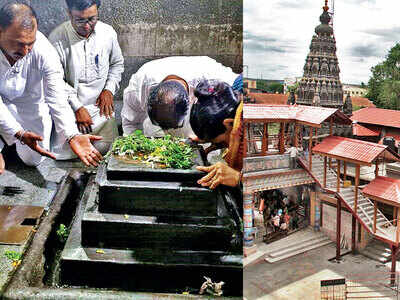Alandi prohibits 800-year-old custom to save tomb from ruin

The sparsh darshan involves devotees touching their head to the tomb at the Alandi temple
Temple trust took ASI’s suggestion before stopping sparsh darshan; certain warkaris raise objections
Alandi-basedSant Dnyaneshwar Maharaj Sansthan’s ban on the maha abhishek, puja and sparsh darshan (wherein devotees touch their heads to the tomb’s edge) of Sant Dnyaneshwar’s tomb (samadhi ) has effectively brought an end to the 800-year-old tradition. The decision follows recent consultations with Archaeological Survey of India (ASI), which sent a report on Tuesday, suggesting conclusion of the practice as it was eroding the holy tomb.
The warkaris have taken umbrage. They have raised objections with the principal district judge (PDJ) of Pune court — who is also the ex-officio president of Alandi temple trust — asserting their “hurt sentiments” that have arisen from the sudden conclusion of a “centuries-old” practice. Moreover, the tomb is among the few shrines in the country where devotees are allowed to directly touch the structure.
Sentiments are rife over the ban on tradition, as some devotees even believe that Sant Dyaneshwar is still underneath the tomb. Furthermore, the temple that was built on the saint’s samadhi is the subject of devotion of many warkaris — whose presence in lakhs during KartikiEkadashi is a testimony to this.
Manish Tathe, one of the devotees, is bewildered over the fact that the trust took the call without taking their views into consideration. “When we touch the samadhi, we feel as if we have encountered Sant Dnyaneshwar himself. We do not abide by the trust’s decision and have raised the issue with the department of law and justice among other authorities. We demand reinstatement of the tradition,” he said.
Madhusudan Maharaj Patil, another member of the warkari community, said, “This is the only such shrine, afterLord Vitthal in Pandharpur and Sant Tukaram Temple in Dehu, where we can touch it physically. This practice is not recent, but as old as the existence of this temple. It signifies equality within the sect — no untouchability is tolerated. Why is this sentiment being snatched from the devotees?”
He claimed that they are waiting for the trust to respond to their objections. Patil also assured that there will not be any protests from their end.
Alandi-based
The warkaris have taken umbrage. They have raised objections with the principal district judge (PDJ) of Pune court — who is also the ex-officio president of Alandi temple trust — asserting their “hurt sentiments” that have arisen from the sudden conclusion of a “centuries-old” practice. Moreover, the tomb is among the few shrines in the country where devotees are allowed to directly touch the structure.
Sentiments are rife over the ban on tradition, as some devotees even believe that Sant Dyaneshwar is still underneath the tomb. Furthermore, the temple that was built on the saint’s samadhi is the subject of devotion of many warkaris — whose presence in lakhs during Kartiki
Manish Tathe, one of the devotees, is bewildered over the fact that the trust took the call without taking their views into consideration. “When we touch the samadhi, we feel as if we have encountered Sant Dnyaneshwar himself. We do not abide by the trust’s decision and have raised the issue with the department of law and justice among other authorities. We demand reinstatement of the tradition,” he said.
Madhusudan Maharaj Patil, another member of the warkari community, said, “This is the only such shrine, after
He claimed that they are waiting for the trust to respond to their objections. Patil also assured that there will not be any protests from their end.
GALLERIES View more photos











































Recent Messages ()
Please rate before posting your Review
SIGN IN WITH
Refrain from posting comments that are obscene, defamatory or inflammatory, and do not indulge in personal attacks, name calling or inciting hatred against any community. Help us delete comments that do not follow these guidelines by marking them offensive. Let's work together to keep the conversation civil.